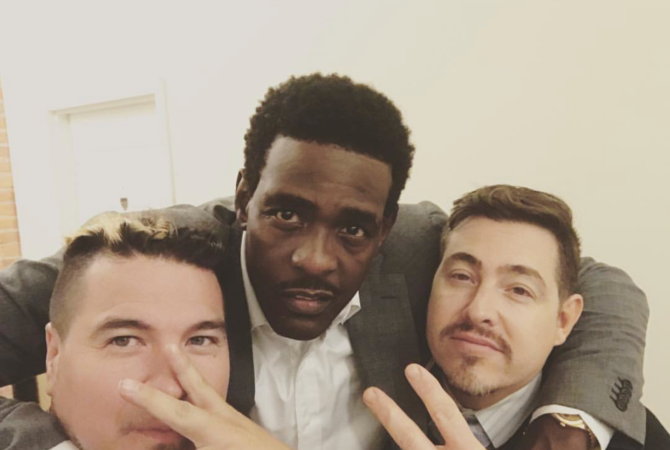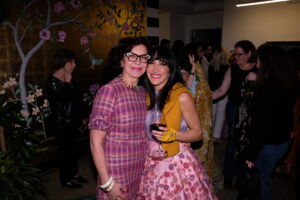Detroit has a Night Time Economy Ambassador. His name is Adrian Tonon, and, as you might expect, he lives in a bi-level loft between Midtown and New Center, two of the city’s trendier neighborhoods. What you might not expect is that his living room is cluttered with instruments and visioning boards. It seems the Night Time Ambassador also plays the role of Life Coach to some of the younger acts on the label he co-founded, Sick Em Records. His living room serves as their practice and meeting space where he personally gives feedback and helps write business plans.
Adrian’s work within the city is vast. His personal work vaster. Which makes our conversation interesting at times. He keeps repeating his desire for Detroit artists to own their own homes. Confusing at first, I realize what he is referring to is a personal effort by him and his peers to do everything in their power to help young artists across the city have stable and successful lives. In some cases, helping individuals buy back family homes that have been lost to foreclosure.
I also learn the power of the Night Time Economy. Each week, along with Michael Reyes, of We Are Culture Creators, Adrian coproduces the After Dark series at the Foundation Hotel, a showcase for many up-and-coming Detroit neo-soul musicians. While playing out is cool, the power is in the business: The mission is to prove to these kids and the city at large the value of the night time economy by showing that their talents are valuable. Playing out is a job. More than that, these same skills can be applied to career in advertising, film and television.
When he learned the TV series, Detroiters was going to be shot in LA, Adrian and his team personally made phone calls and called on favors for discounts from local businesses to create an enticement program for the series. The result: the show was filmed in Detroit and local Detroiters and businesses got their first taste of television work.

Adrian Tonon, Chuck Bennett of 910 AM, and friend
CV Henriette: Tell us about your background. You worked for years in your family’s business. What that always the plan?
Adrian Tonon: I grew up in the restaurant business starting with my family’s original restaurant, Rina’s of Detroit, located for decades on Detroit’s west side. I attended Detroit Country Day School and then Michigan State University. In 1995, even though I resented the business growing up (my parents made me work), I joined my mother full time at our current restaurant, Café Cortina, with a newfound passion for business, entrepreneurship and hospitality.
CVh: How did you move from restaurants to politics?
AT: I always say, “You do not choose public service, it chooses you.” For many years I naturally utilized Café Cortina as a place to gather like-minded folks to break bread, flesh out action plans to address area issues and then go out and live them. Between my parents, who were community minded, and my best friend’s parents, former Mayor Dennis Archer and Judge Trudy Archer, who I spent a lot of time with growing up, I was somewhat groomed in public and private service from childhood. When I heard Mayor Duggan was contemplating running for mayor, I went to the Detroit Medical Center to meet with him. When I walked in, I saw white, black, red, yellow, gay, straight, Jewish, Muslim, all walks of life, working together for the one common purpose of doing good work. I was inspired by his leadership. I joined the campaign early on to create awareness of his ability to lead the city, and also to focus on building a customer service culture around the public sector. He won the election, and I was then appointed as the founding Director of Customer Service for the City of Detroit.
CVh: How did the former prepare you for the later?
AT: It is all connected. Growing up in and eventually operating a family community-driven business prepared me for running a department for the city. Being a lifelong creative in the city, the founding Director of Customer Service and an entrepreneur prepared me for my role as Night Time Ambassador.
CVh: You have a unique title, “Night Time Economy Ambassador.” What are some of some of the duties that come with this role?
AT: The role of Night Ambassador is to manage and improve relations between night businesses, residents and government.
We were recently asked to deliver the keynote in November at the convening of the world’s nighttime mayors, czars and ambassadors in Sydney. This is the content we chose:
City of Detroit’s Night Time Ambassador Adrian Tonon highlights the transformation of this city from financial peril to being widely regarded as one of the most innovative and artistically vibrant cities in the world today.
Unlocking the potential of Detroit’s 24-hour economy deep dives into Detroit’s history; the city’s links to Berlin; and the progress Detroit has made towards realizing the vision of being a 24-hour economy. This keynote will uncover the impact Detroit’s rejuvenation has had on employment, access and public safety; and how innovation is being driven through public/private partnerships and collaborations; and the city’s initiatives in housing for creatives as well as its Creative Chamber.
CVh: What are some of the most common misconceptions around this title?
AT: That it is all about the party. I believe the mission is to advocate for businesses that operate from 6 p.m to 6 a.m., while serving the needs of the community at that time (public safety, transportation, noise). Several of these business are under the umbrella of the 12 sectors of the creative economy. Traditionally around the world, artists, creatives, music venues and the like make a city an attraction, but they are the first to be displaced by development. I believe we are being proactive in order for this not to happen—as much as we can control.
You stated you’re trying to create a “music economy” within the city. What does this look like?
Music is one of the 12 sectors of a creative economy. Music has been my life and passion since I was a kid. Many of my friends are artists. I have always been in the studios. Our mission is to reestablish Detroit as a music epicenter by creating access, opportunity and equity for artists, musicians and the 100 support folks behind the artist. Detroit has a music reputation, but not an industry. We are building alliances to establish a music ecosystem. The goal is create a thriving music city where musicians can sustainably work, live and play.
Tell us about your own music label, Sick Em Records, and how it intersects with the work you’re doing within the city at large.
Sick Em Records is a label I co-founded with my pseudo little brother and first artist signed to the label, Kid Vishis, brother of Royce da 5’9”, who has been one of my best friends since our youth.
Working with artists on a personal level and being in the business you internalize the needs of artists and naturally look for ways to assist them both in city government and the private sector.
Sick Em Records has many alliances in the City. One of the closest is with ‘We Are Culture Creators’ out of Southwest Detroit. Together our mission is to create access and equity for our young black and brown creatives. We curate several evenings around the city. One of the most popular is the Thursday “After Dark” series at the Foundation Hotel. The intention is to pay Detroit artists to perform and then stream five original songs of theirs across eleven Aparium Hotels nationwide and pay for streaming. If we are able to scale this philosophy, artists can once again earn a sustainable living in the city. We truly try to entice them to work, live and play in the City of Detroit. If artists are successful, the ecosystem behind them (lawyers, accountants, studios, visual artists, video, social media) begins to flourish.
You’ve cited instances of working with artists on a case-by-case basis to either help them buy homes or save family homes from foreclosure. Can you speak to this? Is this work that happens through your label or your work with the mayor’s office?
Another alliance we have is with a young woman, Monique Becker, who founded Resident Movement. Through this program we have convened 40 black and brown creative leaders who live in Detroit and are already proving a creative economy (Wghln, Crowd Freak, Art Babes, etc.). They have a seat at the table in public and private sector forums. Whether it is meeting with the head of city departments, the mayor, or leadership from Paxahau, we strive to assess the needs of artists and then implement policy or procedure to better serve them.
What are some of the unique challenges Detroit poses that may not be apparent to people coming here, specifically those pursuing business here?
The cost to do business is rising and communities are fickle (righteously so). Sustainability and concepts that serve the location are key.
For those seeking to do business in Detroit from outside the city, what advice can you offer them for attaining an understanding of its people and cultures?
The best way for folks who are coming here to pursue opportunity is to tag/engage a Detroiter to internalize the fabric of the community and to gain knowledge of local programs and platforms offered to entice business owners, such as Motor City Match, Motor City Re-Store, the Build Institute, Design Core Detroit, ProsperUS Detroit and the like.
It’s easy to blame the mayor for everything, regardless of who the mayor is. Can you speak to some of the challenges the city faces negotiating the needs of the community and the rights of developers?
Some developers are firmly focused on their bottom line. In the private sector there are challenges to what you can enforce and what you cannot. I believe the Mayor’s Office and City Council have been proactive in implementing ordinances and mandates to protect residents and our Detroit workforce. We all work hard to be intentional about the mayor’s principles that guide us. Once a development meets the needs of the community, there are many enticements to assist them in getting the development to the finish line. We want to make it a great experience for residents and developers.
On the subject of night life, are you able to discuss some of the issues facing your own neighborhood? You have businesses like the Recycle Center and the music venue, Marble Bar, who seem to be nervous by the prospect of luxury condos and the noise and complaints they inevitably bring. Do you see a compromise between existing businesses and new development—in this instance, as well as similar scenarios across the city?
The neighborhood at large has a rich history of music, family owned businesses, health care and community pride that still thrives today. It is important that we are intentional about creating something unique that will preserve the fabric of the community while restoring its recognition as a major attraction of the City. Currently there is a 24-hour economy with Henry Ford Health Systems as one of the largest employers and land owners. With existing music venues, creative spaces and new businesses in the Northwest Goldberg neighborhood, as well as the Motown Museum and Henry Ford Health Systems expansions, the reality of a responsible 24-hour economy is achievable. I believe that same neighborhood pride still exists today. There are unified action plans in the works, stakeholder engagement meetings and a newly formed creative coalition on both sides of the boulevard that advocate on behalf of creatives who live and/or work in the area. Our goal is to unify as one to create something special that retains and attracts new residents, business, owners and visitors from all walks of life.





















